Fed up with big fees and long waiting lists, Aussies opt for surgery overseas
Lured by revolutionary advances in surgery, short waiting times and cheaper costs, more Australians are heading overseas for life-changing medical treatment just like our local footy heroes.
Illness
Don't miss out on the headlines from Illness. Followed categories will be added to My News.
Two years of searing back pain and four surgeons later, all unable to help other than to advise that he quit his job, get a pension and go swimming, Jason Wimmer and his wife Hilary started shopping offshore for answers.
Warnings from surgeons that Wimmer was throwing his health away by heading abroad no longer mattered. Offered a solution, he took it.
They sold their second property and went to Germany in December, just as two Collingwood players, Darcy Moore and Jamie Elliott, headed in the same direction to get hamstring problems attended by a German surgeon.
No one frowns on sport stars seeking offshore repairs, but ordinary citizens seeking better lifetime outcomes are seen as extreme risk-takers.
AMA FEE LIST: What you should be paying for surgery
OPINION: Why the Medicare rebate is based on a lie
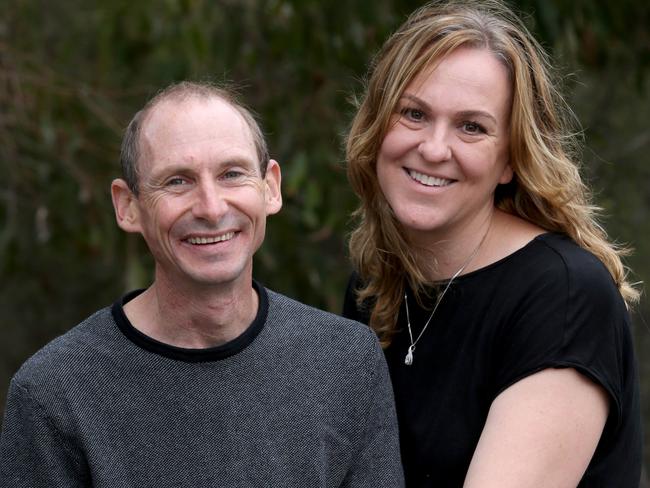
Medical travel, or tourism, is an emerging global phenomenon and the high cost of health care in Australia means it cannot compete.
It’s no longer just cosmetic surgery — breasts, tummy tucks and facelifts — but serious operations that are still considered “elective” in Australia to everyone but the person owning the pain.
It goes beyond hips, knees, backs, IVF and teeth.
In Thailand, a person can get a comprehensive 35-point health test in one morning at the private Bangkok Hospital — from bloods, tumour markers, chest X-rays and much more — with results by lunchtime, for around $730.
No Australian could walk into a public hospital and request anything like it.
A privately insured Australian would wait weeks for similar results and pay thousands — but those even with the highest-level insurance would not be covered for such an array of tests.
Risk or Reward
On cold economic calculus, money is leaving Australia and our medical profession is losing out. But people in pain don’t care who they pay.
Australian GPs and specialists tend to be conservative, which makes them good doctors but it also means they won’t suggest radical alternatives. Desperate people want to hear it all.
The Wimmers found Jake Lemon’s Spine Connection, an Australian-based concierge service that hooks up patients with German surgeons who have been routinely conducting multiple spinal disc implants for decades.
In Australia, the handful of surgeons prepared to undertake such complex surgery would at best perform one disc implant, possibly coupled with spinal fusion.
After providing X-rays, word came back within weeks that German surgeons could restore Wimmer’s back with three disc implants in his neck, and one in his lower lumber.
The cost? $85,000.
Pricing equivalent surgery in Australia is difficult because we could find no Australian surgeon willing to perform the operation.
They especially recoil at the idea of conducting two separate procedures, being the neck and lower back, on the same day, as the Germans did with Wimmer.
RELATED: Australia importing foreign doctors

“Performing a three-level cervical disc replacement and a lumbar disc replacement during the same anaesthetic would be considered bad practice by most surgeons,” said Sydney spinal surgeon Yanni Sergides.
“Exposing a patient to significant unnecessary risk because of the practicalities and economics of performing the surgery abroad does not meet Australian standard of care.”
But Wimmer, from near Geelong, was at the age of 47 facing life on heavy meds. An earlier spinal fusion — a common procedure in Australia, which can limit mobility — had crumbled and his prospects were bleak.
With three young kids, Hilary said she felt like she’d become a single mum.
The Wimmers were on a well-travelled track: long journeys with GPs, specialists, steroid injections, physio and massage.
They entered chat rooms, forums and flashy sites promising miracles and disasters in foreign hospitals.
The manager of one Australian spine surgery said those taking the journey are playing with fire.
“The people with devastating results from medical tourism are embarrassed,” she said. “They’re not going to online and scream about how stupid they are.”

The Wimmers don’t feel stupid.
They are delighted with the results and Jason is heading back to light duties as a building inspector.
They remain confused by the attitude of the Australian medical profession.
“They were saying there is no proof disc-replacement works, that they’re snake oil salesmen,” said Wimmer.
“They were happy to keep me on medication but I’ve got three little kids.”
Hilary said our doctors have become arrogant.
“They are narrow-minded,” she said.
“They think we in Australia are at the top of the medical food chain, but we’re not. Those Germans don’t get paid half what our surgeons are.
“I personally feel really angry they weren’t prepared to think outside the box. This is standard procedure in Germany.”
The $85,000 was a total package for 24 days of care: being met at the airport, surgery, full rehab in a major facility used by European and US sports stars, hotels and guaranteed follow-up work — everything except the airfares.
Still, it was big money and Wimmer found it hard to fathom why he, on private insurance, needed to pay Germany.
“We have the technology, we have world leaders, we have the talent,” he said.
“But we also have the costs and the bureaucracy.”
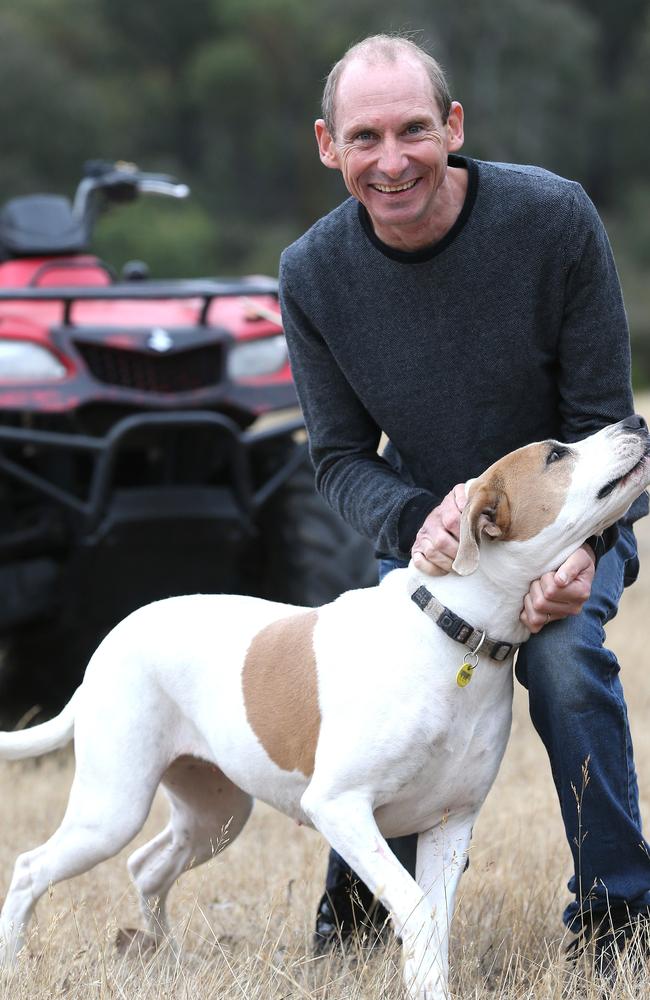
The Australian medical profession has campaigned against Australians heading offshore, but Dr David Martin, president of the Australian Orthopedic Association, said he knows why people are leaving.
“I think people are shopping offshore because they feel the waits are too long, and they are looking at the costs of private care in overseas locations like Thailand and India, and in Germany for spinal surgery,” he said.
“I can understand people will make decisions they think are in their best interests. The public system will look after people but the constraints on health care and the waiting lists are longer than we’d like.”
Wimmer’s private insurance only allowed for one disc implant within the 12-month period. The Germans said he needed four. “We were petrified, we thought it was a Nigerian hoax,” said Hilary.
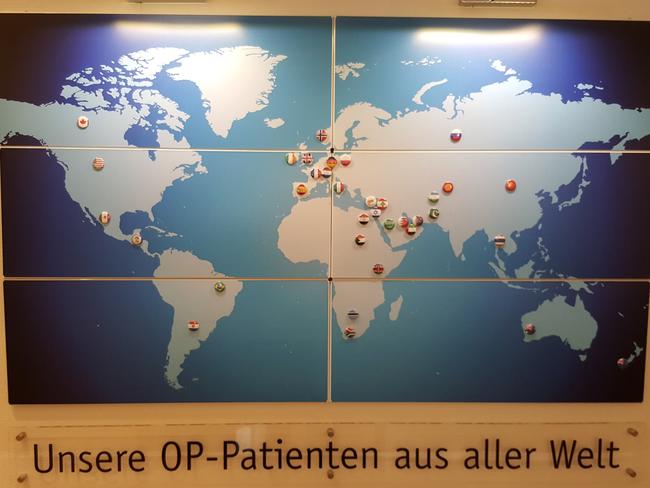
Leading Melbourne surgeon Michael Johnson, president of the Australian Spine Society, did eight single disc-replacement operations some 15 years back but no longer performs them.
He does not believe the scientific literature supports the procedure.
“You need to remember in the private system we’re in a fee-for-service environment,” he said.
“We make our income by operating on people. There is financial incentive. There’s nothing to stop us. You can convince a patient to do anything. If the operation was universally successful, why would we not do it?
“I do only limited spine operations, about 200 a year. I don’t want bad results. That’s not why I do medicine.”
Johnson said the surgery involves a main artery and veins running through to the legs.
“Disc replacement is dangerous,” he said.
“You are not seeing the ones who do badly. Ask yourself: why are we cautious when there’s a financial incentive?”
Long Waits, Fast Fixes
Thailand once had a reputation for mangled breasts, disfigured faces, teeth disasters and gastric-band catastrophes.
That’s changed: it’s got smart and gone for what people need, rather than what they want.
It has become the global destination for major surgery.
Thailand is heavily targeting the Gulf States — Bahrain, Qatar, Iraq, Kuwait, Oman, Saudi Arabia — because they have money and bad health.
Sedentary lifestyles and poor diets have sent diabetes and cancer rates soaring, like in Pacific nations.
Nauruans used to come to Australia but are now bypassing it for Thailand, due to our high prices.
Last year Bangkok Hospital conducted 453 procedures on Nauruans (and 571 procedures in 2017) — mainly cancer, hearts and diabetes. The country only has 13,500 people.
The Digital Dental Surgery Sydney, which urges people to shop carefully and look for hidden costs — and warns you’re unlikely to get travel insurance for elective medical procedures — concedes the scare campaigns aren’t working.
It estimates 10,000 Australians travelled abroad in 2017 for mainly complex dental work. Most went to Thailand.
Private health membership in Australia is declining, with 55 per cent of the population uninsured.
Selling assets, refinancing mortgages or accessing savings and super is now seen as a viable option for those who can’t wait.
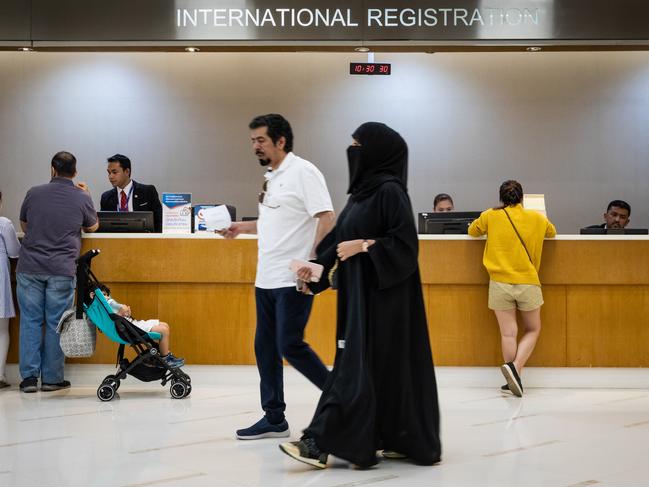
Bangkok’s shiny hospitals serve up the marketing Kool-Aid in big doses, but David Rowland found Thailand had something to sell.
The 78-year-old was limping and in pain and in need of a double-knee replacement.
Darwin’s public hospital told him he’d have to wait 18 months — and that was just for one knee. The other one would have to be installed some months later.
For a man of his age, it’s not what he wanted to hear.
“It’s far too long to wait,” he said.
“I was limited in what I could do. It was a question of dipping into my rainy day money and going over there.”
He was quoted $30,000 for one knee by a local private surgeon.
He found he could get two for $25,000 at Bangkok Hospital.
He went back to the local surgeon who said he’d knock $5000 off the first knee.

The attempt by the surgeon to price-match Thailand didn’t even get close.
Rowland made up his mind.
He arrived in Bangkok on November 20, did some tests the following day and was in 5am surgery the next.
“Done,” he said.
“Here, no one will give you a direct answer or they have their hand out for money. They’re very professional there and they lay it all out. I had a choice of a standard implant or the latest American one, so I went for that. That was another $1000 each, but still within the total $25,000 price.
“I can walk now, no problem. I can drive, whereas before it hurt to push in the clutch.”
Rowland believes our health system is unwell.
“I just think we’ve outpriced ourselves with medicine and care.”
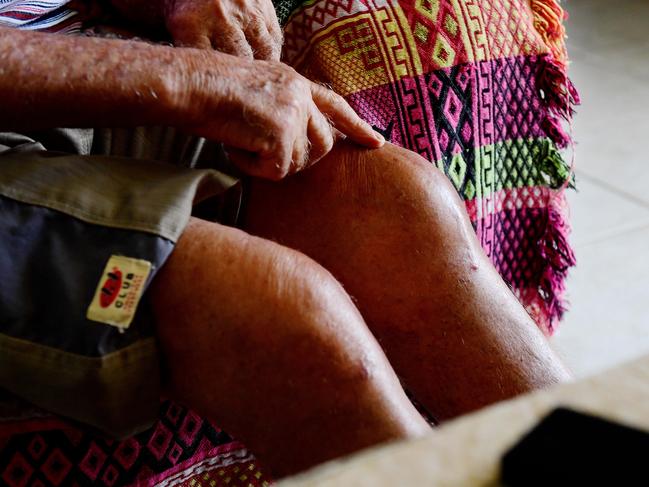
The New Global Hub
Bangkok Hospital is owned by the sprawling Bangkok Dusit Medical Services empire, which runs 46 hospitals across Thailand including a 21 per cent stake in Bumrungrad Hospital, which last year saw half-a-million foreign patients.
BDMS is an aggressive company which makes its many hospitals compete for patients by offering Thai-style hospitality with a vast choice of specialists.
Bangkok Hospital’s marketing director, Ralf Krewer, said the target is “middle-high income, not the super-rich.
They still go to Switzerland or the US. We had patients from 160 countries in 2018.”
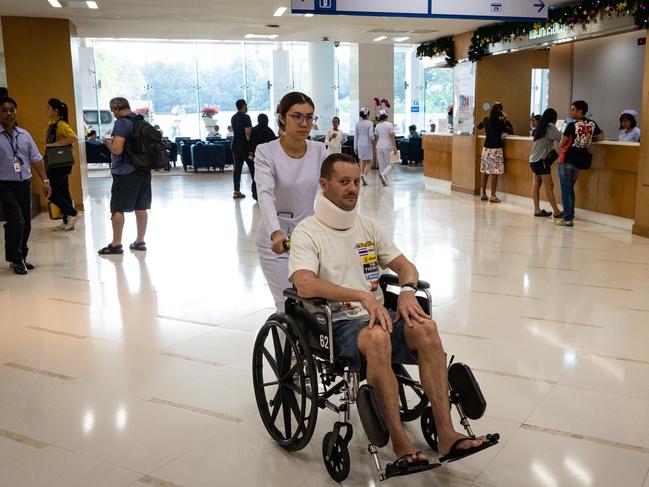
On any day, Bangkok Hospital has 400 staff doctors and 600 on-call specialists, 800 nurses and 300 customer care and translation staff.
The aim is a nurse-to-patient ratio of 1:4.
Singapore has long held a reputation for quality, but it is expensive.
Malaysia is emerging, but still known as a regional hub for Muslim clients.
The Philippines, India and Vietnam are doing teeth and some cosmetic operations, and South Korea is sawing off chins to create the desired teardrop doll-face look.
India offers the full gamut but lacks Thailand’s reputation. Australians know Thailand and feel comfortable there.
Bangkok Hospital does no cosmetic surgery — it has other hospitals in its network for that. The foyer looks like the United Nations during General Assembly.
There are Muslim prayer rooms and a Japanese section.

And on the sixth floor we found Roger Priest, 33, from Mackay.
Priest slipped and broke his neck poolside in Koh Samui on Christmas Eve after drinking what he said were “two Hennesseys”.
Priest’s travel insurer consulted Australian and Thai surgeons and it was agreed he should be treated in Bangkok Hospital for spinal fusion.
The endorsement from Australian experts spoke volumes.
As he prepared to head home, Priest said: “I was told this was one of the best hospitals in the world.
I said, ‘I’ll roll with that.’ I’ve been in Australian hospitals and had staph infections and had a toe operation in private that cost a fortune. I had a 24/7 nurse here and it’s been 10 times better than Australia.”

On the floor below Priest we encountered Sam Cummings, 75, an expat from Newcastle who has multiple health problems and doesn’t have long to live.
He could go home to Australia to spend his final days in the public health system and his daughter, Samantha, visiting from Sydney, says she wishes he would, but her dad is strong-willed.
“They have good doctors and good counselling,” said Cummings.
“I don’t think we have the same level of care in Australia. And here, my wife can sleep in the room with me.”

US surgeon Erik Fleischman has had a varied career, running HIV programs in Africa for the Clinton Foundation, throwing himself in the deep end of ebola, and managing hormone treatments for ageing Hollywood stars such as Mickey Rourke and Steven Seagal.
He is now assisting Australian company CosMediTour as it branches out from cosmetic surgery to bring Arabs to Thailand for lifesaving surgery.
“I’ve worked in Indonesia with Newmont and sent Aussie workers to Thailand rather than Australia because of waiting times,” said Fleischman.
“Australia has a higher quality level for what they see as Australian diseases but they don’t get to see nearly the mix of cultural diseases that they do in Thailand. Australia is an excellent place to get things done, but the waiting lists are long. Here, they can have someone on the table in two days.
“Thailand was smart enough to bring in western managers and the range of what their doctors see has made them good.”

Michael Mitchell has gone from running hospitals in Dubbo and Newcastle to setting up Bangkok Hospital’s new six-star butler-attended hospital, soon approaching completion.
“In Australia, if you have private health insurance, you can get access to any hospital,” he said.
“The reason you would come here is if you don’t have it. You either wait in the public system or you pay out of your own pocket. It’s about half the cost for the procedure here for the same quality of care and the same procedure.
“We do open heart, orthopaedics, gynaecology, cancer — it’s high acuity, lots of comorbidities, high-risk surgeries, lots of sick, sick patients. With Australians, it’s mostly orthopaedics so far.
“People are looking at price. It’s the same procedure, the same prosthetic, and better conditions.”
Back in Black
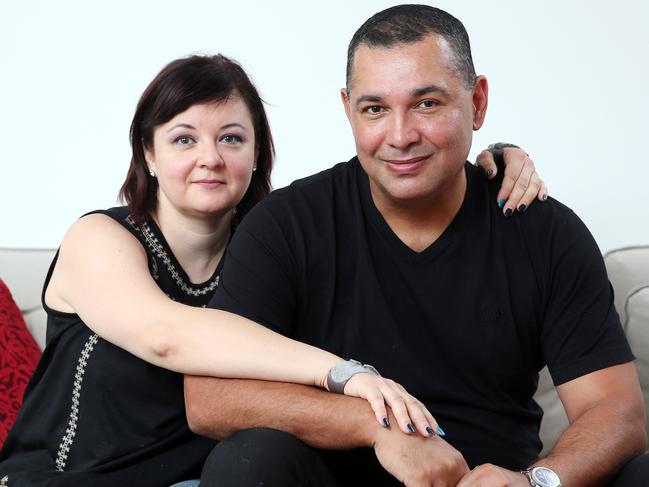
Adrian Barlova was watching her partner, Fabian Perez, 46, becoming an old man before her eyes. Two of the discs in his back had degenerated with disease but he was told he was not a candidate for disc-replacement surgery.
Long stints on physio, epidural steroid injections, and then his worker’s comp ran out and he was made redundant. “I couldn’t walk, I found it hard to shower,” he said.
The Germans quoted $54,000 for a two-disc replacement.
They found Spine Connection, which hits high on Google searches for “spine surgery” because unlike the Australian medical profession, it can legally publish online testimonials from patients who claim they are cured.
Perez is such a person. Two years on, he’s back at work as a photocopier tech.
“I go swimming, I do full-on fitness circuit workouts,” he said.
“I kayak in Sydney Harbour. I don’t take any medication. My life’s gone back to normal.”
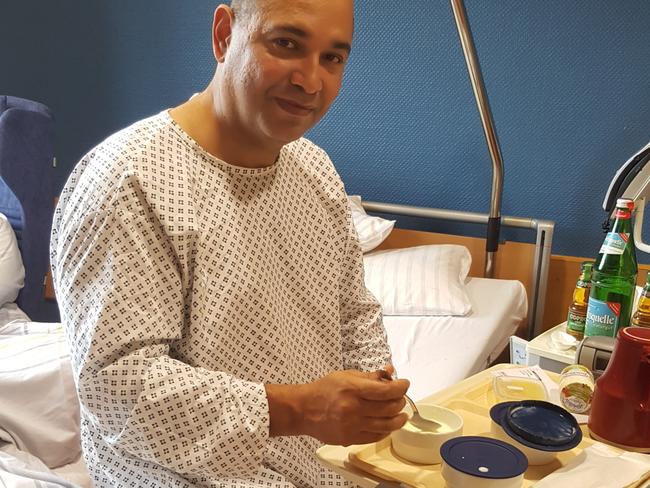
They were nervous but were put in touch with other Australians who’d taken the journey. “Any operation’s a risk but there’s risk in not doing anything,” said Perez.
The operation required them to refinance their mortgage but Adriana said it was worth it: “He’s born again with a new healthy back.”
She said Australia’s reputation for world-class surgeons has limitations.
“People trust Australian doctors so much. They don’t question them; they don’t get second opinions.
“And the industry is too protective of itself. Medical professionals need to be brave and learn from overseas. There are other options for Australian sufferers. Hopefully Australian surgeons will see they are losing. It would be good to keep our patients here.”
* News Corp Australia does not endorse any medical procedure, here or abroad.
Originally published as Fed up with big fees and long waiting lists, Aussies opt for surgery overseas


